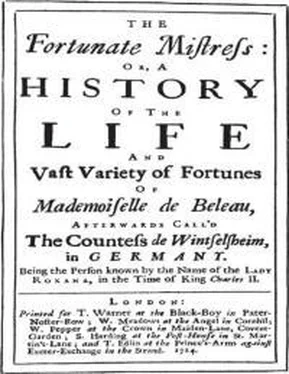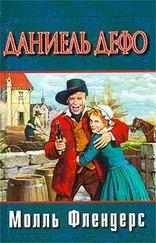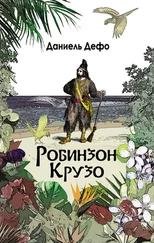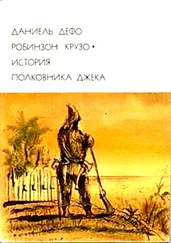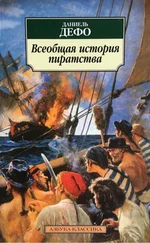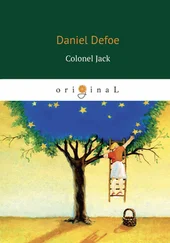an Antick : a grotesque or fantastic dance.
Roxana! Roxana! : by Defoe’s day ‘Roxana’ had become a generic name for an oriental queen, suggesting ambition, wickedness, and exoticism. She is known to history as a wife of Alexander the Great and, as Roxolana, as the wife of Suleiman the Magnificent. There are Roxanas in several seventeenth-century works, notably in the immensely popular Rival Queens (1677) by Nathaniel Lee, as well as in William Davenant’s Siege of Rhodes (1656), Roger Boyle’s Mustapha (1665), and Racine’s Bajazet (1672; adapted for the English stage by Charles Johnson in 1717 as The Sultaness) . See also note 333.
the Box : the kitty, or pool into which the players contribute a proportion of their winnings to be distributed for expenses, such as the tips to the servants.
Glass-Chairs : sedan chairs fitted with glass windows.
a promiscuous Crowd : a crowd in which the social classes are indiscriminately mixed.
blue Garters : insignia of the Knights of the Garter, the highest order of English knighthood.
Point : needlepoint lace.
Antick : fantastic, odd.
Safra : the sofa as used in Eastern countries was as Roxana describes it. Sofa as a word used to describe a stuffed couch first made its appearance in the early eighteenth century.
an Instrument like a Guittar : the Armenian kamancha .
a small low-sounding Trumpet : the Armenian doudouk .
Tyhiaai : cf. Tyhaia (pp. 292, 338). The word is not Turkish, but is probably an attempt to render the Arabic Tāqiyya , an imposing headgear worn by women in Syria and Egypt in the fourteenth century. The term was later applied to other types of head-dress.
with his Hat on : i.e., the King.
the D — of M — th : the Duke of Monmouth (1649–85), Charles II’s illegitimate son by Lucy Walter, created Duke of Monmouth in 1663.
a Baulk to my View : i.e., got in the way of their considering her.
a meer Roxana : nothing more or less than a whore. Possibly an allusion to Hester Davenport, a well-known actress and mistress of the Earl of Oxford, who took the part of Roxana in several plays. ‘Roxolana’ is used in Congreve’s The Way of the World (1700) as a synonym for whore.
blown : faded (used of a flower that has blossomed).
Compliment, or Appointment : gift, or arrangement.
by : as concerns.
a Goldsmith’s Bill : a form of paper currency that preceded the bank note. The practice of depositing money and other valuables with London goldsmiths (because they had strong-rooms) arose in the seventeenth century. The goldsmiths issued receipts – sometimes several receipts of convenient amounts equal to the total value of the deposit – payable on demand. Gradually these receipts became negotiable (by 1668 at the latest), after which they came to be called notes or bills.
Correspondence : relationship.
the Park : St James’s Park. John Kip’s engraving, A Prospect of the City of London, Westminster, and St James’s Park (c . 1700), shows houses on the south and east sides of the park with garden doors that open directly on to the park.
Fire : lightning.
fell foul of : attacked.
shifted me : changed into clean underclothing.
Ecclairicissiment: éclaircissement , clearing up.
Apprenticeship : From 1562 to 1814 no one was permitted by law to engage in a trade until he had served an apprenticeship of seven years. An apprentice was bound by contract (an indenture) to a master, who undertook to teach him his trade in return for a fixed payment and sometimes other considerations (in this case, clothing). The amount of payment increased with the desirability of the trade.
put to a Turkey-Merchant : made apprentice to an importer of Turkish goods.
discover’d : revealed.
while the Masks and Balls were in Agitation : masquerade balls were revived early in the reign of George I (1714–27) and, under the management of the Swiss promoter, John James Heidegger, became immensely popular. See notes 188–9.
Kensington Gravel-Pitts : Despite its name, a pleasant and fashionable village on the direct road to Uxbridge and Oxford (now the Bayswater Road), at the north-west corner of Kensington Palace Gardens. The gravel pits, from which it took its name, were near by.
Quarter-Day : one of the four days which by ancient custom mark off the quarters of the year, on which tenancies of houses usually end and rents are due.
For HONESTY and HONOUR, are the same : Defoe, The Character of the late Dr Samuel Annesley (1697), in A True Collection of the Writings of the Author of The True-Born English man (1703), p. 113.
Mechanick : a manual labourer.
put-out : apprenticed.
was out of his Time : had served his apprenticeship.
Hammer-Cloths : the cloth coverings of the driver’s seat.
to the Life : in every detail.
the Minories : a street between Aldgate and the tower in the City of London.
QUAKERS : Quakers practised a sober way of life, abstaining from all frivolity, the pursuit of pleasure, and even from music and art. Their distinctive clothing (see note 231) and mode of speaking aroused animosity, and they were frequently reviled in the seventeenth and early eighteenth centuries. Defoe, however, did not share the widespread dislike of them.
Goodman’s-Fields : originally pastures lying east of the Minories owned by a farmer called Goodman, but by 1720 converted into streets with houses occupied by merchants. The area was prosperous but unfashionable.
the Dress of the QUAKERS : Quakers wore very plain, simply-made clothes. Particularly distinctive were the plain, broad-brimmed hats of the men, worn instead of wigs, and the old-fashioned country hats with high pointed crowns like church steeples of the women.
Holland : linen (originally from Holland).
Grimace : pretence, sham.
Читать дальше
